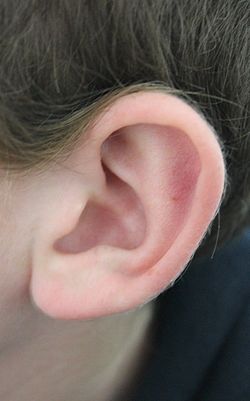Here’s another selection of quotes from Sir Ken Robinson‘s new book – The Element. They’re taken from Chapter 2: Think Differently.
One of the principles of the Element is that we need to challenge what we take for granted about our abilities and the abilities of other people.
A good example of something that many people take for granted without knowing it is the number of human senses.
[Most people believe we have five – taste, touch, smell, sight, and hearing. However, there’s another that’s “fundamental to out functioning in the world” – our sense of balance.]
The fluids and bones of the inner ear mediate the sense of balance. You only have to think of the impact on your life of damaging your sense of balance – through illness or alcohol – to get some idea of how important it is to our everyday existence. Yet most people never think to include it in their list of senses. They just take it for granted.
Physiologists largely agree that in addition to the five we all know about, there are four more. The first is our sense of temperature (thermoception). This is different to our sense of touch. We don’t need to be touching anything to feel hot or cold.
Another is the sense of pain (nociception). Scientists now generally agree that this is a different sensory system from either touch or temperature.
Next is the vestibular sense (equilibrioception), which includes our sense of balance and acceleration.
Then there is the kinesthetic sense (proprioception), which gives us our understanding of where our limbs and the rest of our body are in space and in relationship to each other. This is essential for getting up, getting around, and getting back again.
……………………………………….
Readers might recall we referred to proprioception in a recent blog –
https://3diassociates.wordpress.com/2012/05/02/the-spirit-to-play-and-physical-intelligence/
Guitar playing is a physical activity that demands training. The body must acquire an intelligence of its own. The muscles must learn to move in new and disciplined ways.
Those who followed the link to Wikipedia will have seen the page there on the subject of proprioception –
Proprioception, from Latin proprius, meaning “one’s own” and perception, is the sense of the relative position of neighbouring parts of the body and strength of effort being employed in movement. It is distinguished from exteroception, by which we perceive the outside world, and interoception, by which we perceive pain, hunger, etc., and the movement of internal organs.
Although the word kinesthesia is sometimes used interchangeably with proprioception, kinesthesia is the sense of body motion.
………………………………………….
Ken Robinson goes on to say:
All of these senses contribute to our feelings of being in the world and to our ability to function in it. [Our senses profoundly affect] our understanding of the world and of ourselves. Yet many of us don’t know or have never thought about some of them.
Athletes . . . have a profound sense of the capacities of their physical bodies, and their achievements show how limited our everyday ideas about human ability really are. If you watch athletes, dancers, musicians, and other performers at work, you can see they are thinking, as well as performing, in extraordinary ways. As they practice, they engage their whole bodies in developing and memorising the routines they are shaping up. In the process, they are relying on what some call “muscle memory”. In performance they are usually moving too quickly and in ways that are simply too complex to rely on the ordinary conscious processes of thinking and decision-making. They draw from the deep reserves of feeling and intuition and of physical reflex and coordination that use the whole brain and not only the parts at the front that we associate with rational thinking. If they did that, their careers would never get off the ground.
In these ways, athletes and all sorts of other performers help to challenge something else about human capacity that too many people take for granted and also get wrong – our ideas about intelligence.
To be continued.
…………………………………………
On a slightly different issue, take a look at this link from the Guardian this week and our response to it.
http://www.guardian.co.uk/education/2012/may/07/schools-forced-academies
You can find our response on our website in the 3Di in Focus section – www.3diassociates.com
http://www.3diassociates.com/b_focus.htm
We are passionate about wellbeing and the achievement of children and young people. We are also very committed to supporting our professional colleagues who are working in extremely trying conditions for the benefit of children.
The entire politicisation of education through the development of academies and the bullying that is taking place to get headteachers to “choose” this alternative to local authority control is quite staggering.
If you have any comments having read the in Focus, please do get in touch with us either through the website (Contact Us) or this blog.

